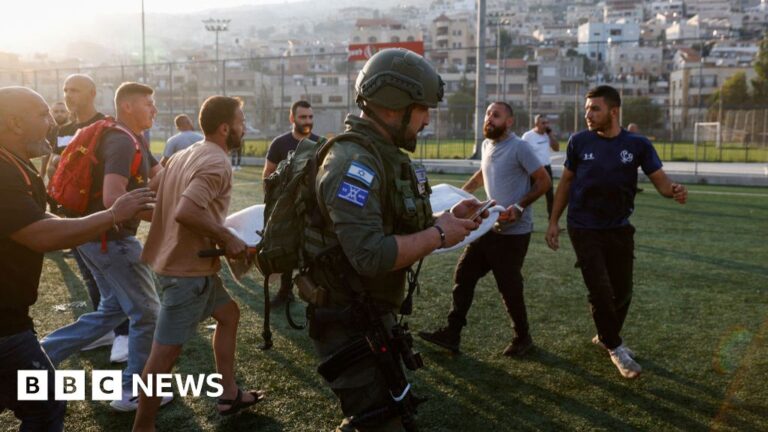- author, Paul Adams
- role, BBC Diplomatic Correspondent
-
The Israeli Air Force said it had struck Hezbollah positions in Lebanon after a rocket attack killed 12 children and young people playing soccer in the Israeli-occupied Golan Heights.
Israel has claimed responsibility for Saturday’s attack on the Druze town of Majdal Shams from a Lebanese militant group, but Hezbollah has strongly denied any involvement.
The Israel Defense Forces said it had carried out airstrikes on seven Hezbollah positions “deep inside Lebanese territory” early on Sunday. It was unclear whether there were any casualties.
Rising tensions could spark all-out war between Israel and Hezbollah, whose armies have been exchanging regular gunfire since the Israel-Gaza war erupted in October.
The bloodbath at the town’s soccer field on Saturday was the deadliest along Israel’s northern border since Hamas attacked Israel on October 7.
Fighting with Hezbollah, previously sporadic, intensified the day after the Hamas attack when Hezbollah fired rockets at Israeli positions in solidarity with the Palestinians.
Israeli Prime Minister Benjamin Netanyahu vowed to retaliate against Hezbollah shortly after Saturday’s attack, saying the group would “pay a heavy price.”
Hours later, the Israeli Air Force said it had carried out a nighttime strike on “terrorist targets” including “weapons depots and terrorist infrastructure.”
A UN statement said “maximum restraint” by all parties was crucial as there was a risk that the conflict could escalate and “plunge the entire region into incredible catastrophe”.
Hezbollah spokesman Mohammad Afif has denied responsibility for the attack and the BBC is attempting to verify reports that the militant group told the UN that the blast was caused by an Israeli interceptor rocket.
The Israeli Foreign Ministry released the names and ages of 10 of the victims, saying they were children between the ages of 10 and 16. The name of the 11th was released but not his age. Details of the 12th victim have not been confirmed.
Verified video showed crowds gathering at the soccer field and a stretcher being rushed to a waiting ambulance.
Majdal Shams is one of four villages in the Golan Heights that are home to around 25,000 members of the Arabic-speaking Druze religious and ethnic group.
Before reports of the attack’s impact, Hezbollah had claimed responsibility for four other attacks.
One was at a nearby military installation on the slopes of Mount Hermon, on the Golan Heights border with Lebanon, about three kilometers (two miles) from the soccer field.
IDF spokesman Daniel Hagari, who visited the scene of the attack, accused Hezbollah of “lying and denying responsibility for the incident.”
He said the rocket was an Iranian-made Falak 1 and was “exclusively owned by Hezbollah.”
“Our intelligence is clear: Hezbollah is responsible for the killing of innocent children,” he said, adding that Israel was preparing to retaliate.
Israel and Hezbollah periodically exchange artillery fire, causing casualties on both sides, but since October both sides have refrained from any actions that could escalate into a broader war in southern Lebanon.
Israeli Prime Minister Benjamin Netanyahu, who was visiting the United States, will return home earlier than scheduled.
Israeli Druze leader Sheikh Mowaffak Tarif said in an angry statement that “this horrific massacre” crossed “every possible red line”.
“No decent state can tolerate the continued harm to its citizens and residents, which has been the ongoing reality in northern communities for the past nine months,” he added.
“We are facing all-out war,” Foreign Minister Israel Katz told Israel’s Channel 12 news.
Israeli President Isaac Herzog called the incident a “horrific and shocking disaster” and said the “State of Israel will resolutely defend its people and sovereignty.”
The Lebanese government also issued an unprecedented statement, saying it “condemns all acts of violence and aggression against all civilians and calls for an immediate cessation of hostilities on all fronts.”
“The targeting of civilians is a clear violation of international law and runs counter to humanitarian principles,” the statement added.
The United States and the EU also condemned the attack.
U.N. Special Envoy Tor Veneslund condemned the incident and called on all sides to exercise restraint.
“The Middle East is in crisis and the world and the region cannot afford a new open conflict,” he wrote to X.
Most Druze live in northern Israel, Lebanon, Jordan and Syria. In Israel, they have full citizenship rights and make up about 1.5 percent of the population.
When the Golan Heights was annexed from Syria in 1981, people living there were offered Israeli citizenship, but not everyone accepted.
Golan Heights Druze can study and work in Israel, but only those with citizenship can vote.
Druze men in Israel are required to serve in the army, and they are the largest non-Jewish group in the Israel Defense Forces.
The majority of the international community does not recognize Israel’s annexation of the Golan Heights.
Additional reporting by Mallory Mench

